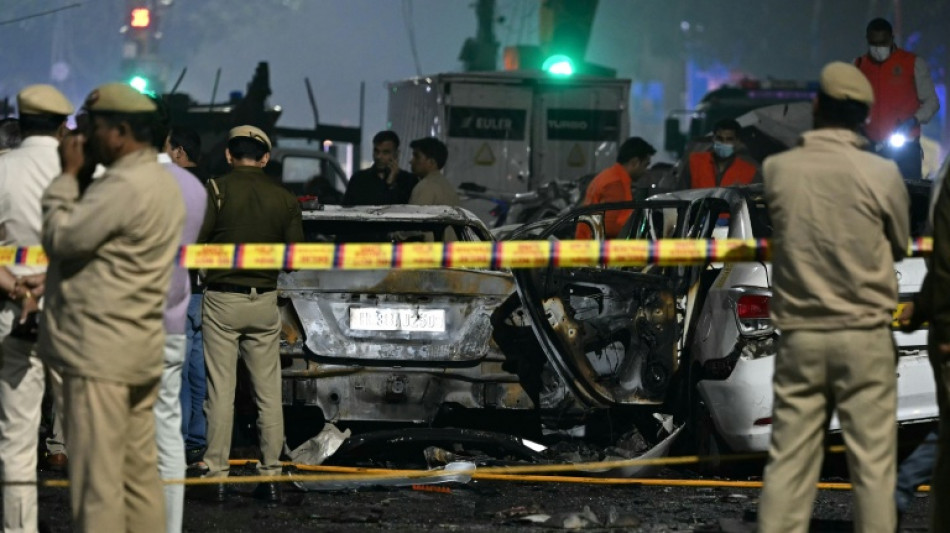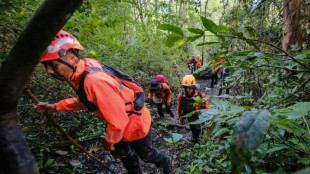
-
 Ruthless Anisimova races into Australian Open round two
Ruthless Anisimova races into Australian Open round two
-
Australia rest Cummins, Hazlewood, Maxwell for Pakistan T20 series

-
 South Korea, Italy agree to deepen AI, defence cooperation
South Korea, Italy agree to deepen AI, defence cooperation
-
Vietnam begins Communist Party congress to pick leaders

-
 China's 2025 economic growth among slowest in decades
China's 2025 economic growth among slowest in decades
-
Gauff, Medvedev through in Australia as Djokovic begins record Slam quest

-
 Who said what at 2025 Africa Cup of Nations
Who said what at 2025 Africa Cup of Nations
-
Grizzlies win in London as heckler interrupts US anthem

-
 Three-time finalist Medvedev grinds into Australian Open round two
Three-time finalist Medvedev grinds into Australian Open round two
-
Auger-Aliassime retires from Melbourne first round with cramp

-
 Rams fend off Bears comeback as Patriots advance in NFL playoffs
Rams fend off Bears comeback as Patriots advance in NFL playoffs
-
Thousands march in US to back Iranian anti-government protesters

-
 Gotterup charges to Sony Open victory in Hawaii
Gotterup charges to Sony Open victory in Hawaii
-
Gold, silver hit records and stocks fall as Trump fans trade fears

-
 Auger-Aliassime retires injured from Melbourne first round
Auger-Aliassime retires injured from Melbourne first round
-
Gauff through, Auger-Aliassime retires as Djokovic begins record quest

-
 China says economy grew 5% last year, among slowest in decades
China says economy grew 5% last year, among slowest in decades
-
Young star Zheng may have to give back Australian Open prize money

-
 Gauff overcomes wobble in winning start to Melbourne title bid
Gauff overcomes wobble in winning start to Melbourne title bid
-
Harry set for final courtroom battle against UK media

-
 'It wasn't clean': Mother mourns son killed in US Maduro assault
'It wasn't clean': Mother mourns son killed in US Maduro assault
-
Louvre heist probe: What we know

-
 Surging billionaire wealth a political threat, Oxfam warns as Davos opens
Surging billionaire wealth a political threat, Oxfam warns as Davos opens
-
Morocco fans stunned, disappointed as Senegal win Africa title

-
 Senegal fuelled by 'injustice' in AFCON final triumph, says hero Gueye
Senegal fuelled by 'injustice' in AFCON final triumph, says hero Gueye
-
Morocco coach Regragui laments 'shameful' scenes in AFCON final defeat

-
 Maye, Boutte wonder-catch carry Patriots past Texans
Maye, Boutte wonder-catch carry Patriots past Texans
-
Train collision in Spain kills 21, injures dozens

-
 Brazilians Abner, Endrick help Lyon climb to 4th in Ligue 1
Brazilians Abner, Endrick help Lyon climb to 4th in Ligue 1
-
Barca beaten at Real Sociedad as Liga title race tightens

-
 Socialist to face far-right candidate for Portugal's presidency
Socialist to face far-right candidate for Portugal's presidency
-
Senegal stun hosts Morocco to win AFCON title after final walk-off protest

-
 Syria's leader agrees truce with Kurds after govt troops advance
Syria's leader agrees truce with Kurds after govt troops advance
-
Morant shines as Grizzlies top Magic in London

-
 Real Sociedad end Barca winning streak to tighten Liga title race
Real Sociedad end Barca winning streak to tighten Liga title race
-
Senegal stun hosts Morocco to win AFCON title after ugly scenes mar final

-
 AC Milan in touch with Inter thanks to Fullkrug's first Serie A goal
AC Milan in touch with Inter thanks to Fullkrug's first Serie A goal
-
Lyon climb to fourth in Ligue 1 with victory over Brest

-
 Morant shines as Grizzles top Magic in London
Morant shines as Grizzles top Magic in London
-
Trump admin orders 1,500 troops to prepare for possible Minnesota deployment

-
 Limited internet briefly returns in Iran after protest blackout
Limited internet briefly returns in Iran after protest blackout
-
South Africa declares national disaster as floods batter region

-
 Gang members in Guatemala kill seven police after prison crackdown: minister
Gang members in Guatemala kill seven police after prison crackdown: minister
-
Villa's title bid rocked by Everton loss, Newcastle held at Wolves

-
 Dybala boosts Roma's Champions League hopes, Fiorentina honour Commisso
Dybala boosts Roma's Champions League hopes, Fiorentina honour Commisso
-
Villa's title bid rocked by Everton loss, Newcastle held by Wolves

-
 'Avatar: Fire and Ash' at number one in N.America for fifth straight week
'Avatar: Fire and Ash' at number one in N.America for fifth straight week
-
Limited internet returns in Iran after protest blackout

-
 Syria's leader agrees truce deal with Kurds after govt troops advance
Syria's leader agrees truce deal with Kurds after govt troops advance
-
Smith's penalty sees Quins eliminate La Rochelle, Bordeaux secure top seeding


What we know about deadly Delhi car blast
India has vowed to bring to justice the "perpetrators, their collaborators, and their sponsors" behind the deadliest explosion in the nation's capital for more than a decade.
But in the days since Monday's blast, which hospital officials told AFP had killed at least 12 people and wounded 30, authorities have released few details.
Indian media, meanwhile, has been rife with speculation about the most nation's serious security incident since April 22, when 26 mainly Hindu civilians were killed at the tourist site of Pahalgam in Indian-administered Kashmir, sparking clashes with Pakistan.
New Delhi has condemned the November 10 explosion as "a heinous terror incident" carried out by "anti-national forces".
Here is what is known so far:
- What happened? -
The car exploded near a busy metro station close to the historic Red Fort in the capital's Old Delhi quarter -- where the prime minister delivers the annual Independence Day address.
Prime Minister Narendra Modi called the incident a "conspiracy".
However, key facts are unconfirmed.
That includes who was in the vehicle, what type of explosive was used and whether the blast site was the intended target.
It is unclear whether the attack was carried out by a domestic group or had foreign links.
The explosion occurred just hours after police arrested several people, and seized explosive materials as well as assault rifles.
Police said the suspects were linked to Jaish-e-Mohammed (JeM), a Pakistan-based group with Al-Qaeda ties, and Ansar Ghazwat-ul-Hind, a Kashmir offshoot linked to JeM.
Regarding those arrests, India's Jammu and Kashmir police said it was a "white collar terror" group, involving "radicalised professionals and students in contact with foreign handlers, operating from Pakistan and other countries".
But no official has linked the earlier arrests with the Delhi explosion.
- How has India responded? -
The anti-terrorism National Investigation Agency (NIA) is leading the probe.
Police have conducted sweeping raids since the blast, including in disputed Kashmir, targeting the banned Islamist political party, Jamaat-e-Islami (JeI) -- but there has been no confirmation this is connected to Monday's explosion.
Kashmir has been divided between India and Pakistan since their independence from British rule in 1947, and both claim the Himalayan territory in full. Tensions remain high between New Delhi and Islamabad.
Police also arrested several suspects, including doctors affiliated with Al-Falah University in Faridabad, on the southern outskirts of the capital.
Again, officials have not said those detained are connected to the explosion.
- Why is India appearing cautious? -
Home Minister Amit Shah has said the government is awaiting the results of a "swift and thorough inquiry".
Following the April attack in Kashmir, India took one day to say that the gunmen had "cross-border linkages" with Pakistan -- claims Islambad denied.
In May, India conducted strikes inside Pakistan, triggering four days of intense conflict that killed at least 70 people.
After a ceasefire, Modi vowed that "any attack on Indian soil will be considered as an act of war".
Public expectations for a strong response to Monday's blast are therefore extremely high.
Security agencies are under pressure to produce an airtight investigation, given the potential consequences of assigning blame.
But diplomatic considerations may also be shaping New Delhi's stance.
India is keen to secure a major trade deal with the United States, its largest trading partner, after President Donald Trump imposed 50 percent tariffs on Indian goods over its purchases of Russian oil.
Trump has publicly taken credit for brokering the ceasefire between India and Pakistan in May and has cultivated closer ties with Islamabad following its praise of him.
Modi, consistent with New Delhi's longstanding opposition to third-party mediation in Kashmir, said the deal was agreed directly.
T.Suter--VB


